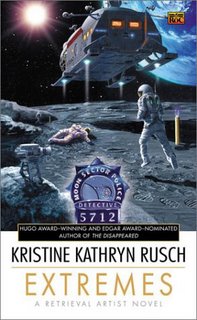Kristine Kathryn Rusch: Extremes
 The second in the Retrieval Artist series of novels, Extremes is a classic police procedural science fiction hybrid, with action that takes place, 24-style, over just one day.
The second in the Retrieval Artist series of novels, Extremes is a classic police procedural science fiction hybrid, with action that takes place, 24-style, over just one day.As a failed writer (among many other failures), I find it interesting to see Rusch's narrative technique. She moves rapidly between three main points of view (Flint, the Retrieval Artist, De Ricci, the cop, and Oliviari, a Tracker posing as a medic), picking up each strand of narrative, not after the elision of some time, but where she left off. There isn't time, in other words, for one character to learn the full details of what another knows, and so all three of them reach their own conclusions based on their own portion of the evidence.
The crime in question is a murder during a - preposterous - extreme sport event on the Moon. Unbelievable, you'd think, if you didn't already know the hilariously stupid risks people already take on Earth in order to entertain themselves. Of course people will try equally stupid things on the Moon.
So, police procedural, but what does SF add to the mix? The setting, obviously, plays a key role. One of the great details of Rusch's Retrieval Artist future is that people inhabit domed communities on the Moon, which turns out to be not very glamorous. The air recycling is inefficient, so it can get stuffy; the community has expanded haphazardly over a length of time, so there are old/new bits, crappy building materials, low quality synthesised foods, and so on. Crucially, in a domed community living on recycled air, the release of a deadly virus has a particular impact.
This creative use of the setting extends into the 3rd in the series, Consequences, in which an assassin doctors a crime scene by reprogramming the cleaning robots. First of all they suck up the blood and brains; then the killer re-arranges the bodies, and the robots spew it all out again in a pattern to match the new arrangement. Genius. How would Gil Grissom cope with that?

0 Comments:
Post a Comment
<< Home